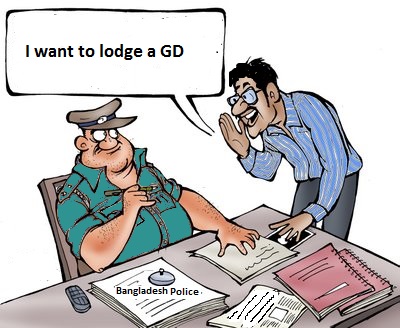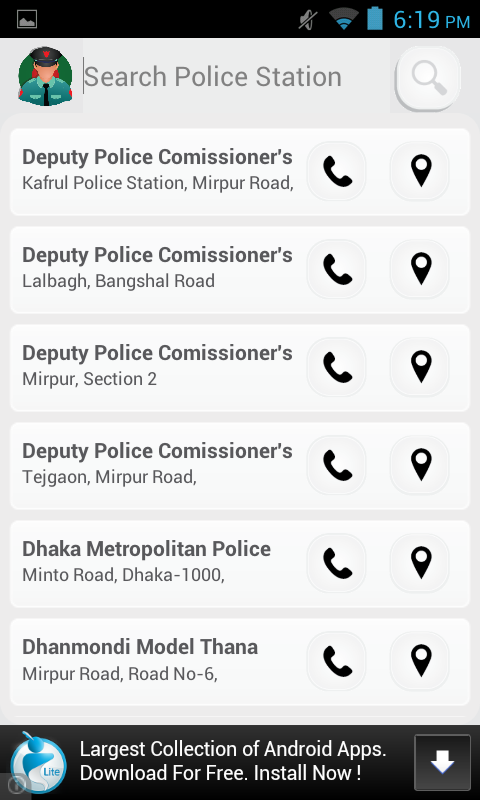 Definition:
Definition:
GD means General Diary, which is used as register to record 24 hours incidents that are happening or likely to happen, within the jurisdiction of the police station on a daily basis and if any incident has taken place or likely to take place then any person can file an application for GD entry.
Who can lodge a GD in Bangladesh: A GD can be lodged by any person. The person need not necessarily be the victim or injured or an eye-witness.
When to lodge GD: GD can be lodged for any incidents/offences/problems or other matters that happened or likely to happen, for example-
*loss or theft of passport, certificates, identity cards, cheques or other important documents.
*Loss of valuable things.
*Lost person or disappearance of any person
*Snatching
*information on Eve teasing and teasers, drug addicts, vagabond, miscreants, unlawful assembly
*recruitment or disappearance of servants, night guards, guards, drivers, caretakers
*new or old tenants
*Expatriate problems/complains
*any other incidents/problems/complains/matters
Procedure for lodging GD in Bangladesh: A GD is received by the Duty officer or Service Delivery Officer of the police station. The General Diary is kept under the supervision of the Officer-in-Charge (OC) of the police station. Everyday GD entry starts from 8 am and closes after completion of 24 hours.
To lodge a GD, follow application format addressing the Officer-in-Charge (OC) and put address of the concerned police station and subject for the GD. The body of the GD application must contain elaborate description of the incident. Provide your signature, name, address and contact number in the end of the GD application. Then make two copies of this GD application and go to the concerned police station. Give GD copies to the Duty officer of the police station. After putting GD number, date, signature and seal the duty officer will keep one copy and return you another.
If anyone cannot write a GD then can ask for help from the Duty Officer or Service Delivery Officer of the police station.
After receiving a GD application, the Duty Officer/Officer-in-Charge (OC) will order to inquiry veracity of the matter and will take further steps according to law.
Fees: There is no government fee for lodging a GD or for taking help in writing a GD.
Laws on GD in Bangladesh:
1.Regulation 377 of the Police Regulation of Bengal
2. Section 44 of the Police Act 1861
3. Section 154, 155 of the Criminal Procedure Code
1.Police Regulation of Bengal (PRB) 1943 : 377: The General Diary (12 Act V, 1861)
a) The general diary as prescribed under section 44, Police Act, 1861, and sections 154 and 155, Code of Criminal Procedure, shall be kept in B. P. Form No. 65 at all Police-Stations. The officer-in-charge is responsible that it is punctually and correctly written. He shall himself make all but the routine entries. The diary shall be written in duplicate with carbon paper. Each book shall contain 200 pages, duly numbered.
b) Every occurrence which may be brought to the knowledge of the officers of police shall be entered in the diary at the time at which it is communicated to the station, and if no incident be communicated during the day, this fact shall be noted in the diary before it is closed and despatched.
c) In it shall be recorded, as concisely as is compatible with clearness, all complaints and charges preferred, whether cognizable or not , the names of the complainants, the names of all persons arrested, the offences charged against them, the weapons or property of which the police have taken possession, and the names of the witnesses who have been examined. In the case of a person arrested, his name, the number of the case in which arrested, the dates of arrest and receipt in the station lock-up. The date and hour when forwarded to the court, and the expenses, if any, incurred in feeding shall be noted.
d) The fact of enquiries having been made regarding absconders and surveillers shall be briefly noted. A note of the number and date of entries in the diary shall also be made in the registers where detailed entries are made. If help is given to excise officers in the detection or prevention of excise offences, the fact shall be noted.
e) Information obtained in regard to the following matters relating to general administration shall also be entered :-
The state of crops, roads, rivers, bridges, railway fences, Government buildings, ferries, embankments, trees, telegraph lines, etc. the occurrence of large fires, inundations, storms, railway, or other serious accidents; the out break, prevalence, on cessation of cholera, small-pox, fever or other epidemic disease; serious cattle disease, the passage through, or gathering together within the limits of the station circle of large bodies of people; the arrival and dispatch of prisoners; the receipt and disbursement or transmission of cash; particulars of taking and making over charge; distribution of duty among officers, change of police-station sentry; the holding of parade, quinine parade, kit inspection, barrack inspection; departure and arrival of offences to and from the mufassil, or on or from leave; transfers and new arrivals of officers; misconduct or instances of meritorious behaviour on the part of subordinates; assistance rendered by pachayats or members of union boards in all matters not connected with the actual investigation of cases; arrival and dispatch of the mail; submission of periodical returns, and the imparting of instruction in drill, procedure and other duties to constables; all information as to threatened disturbances; attendance of dafadars and village chaukidars, the information furnished by them at muster parade or otherwise obtained regarding the presence of suspicious characters, gamblers, swindlers, foreigners or members of wandering tribes; the occurrence of any suspicious deaths amongst cattle; the presence of strange boats at village ghats, and the disappearance of any therefrom, and the result of enquiry, if any made, regarding them by dafadars and chaukidars, if such information has not been entered in the Village Crime Note Book.
f) Whenever any escort over treasure or prisoners passes a police-station or out post, whether the escort be of that district or of any other, the fact shall be entered in the diary, and the officer-in-charge shall enter and put the date and hour on the command certificate of the escort. In the case of escorts over prisoners, an entry shall be made in the diary if the prisoners are fed, what food was given and who were present at the time.
g) Every entry made in the diary shall be given a marginal heading in as few words as possible, and shall be numbered in a monthly series and attested by the signature of the officer-in-charge at the time.
h) An entry in the diary does not obviate the necessity of a separate report of any occurrence which is required by rule or order to be specially reported.
i) The collection and communication of intelligence on all matters of public importance is one of the principal duties of the police, and the manner in which this duty is performed by an officer in charge of a station will generally be manifested in his general diaries. Officers shall, therefore, endeavor to render their diaries as complete, but at the same time as concise, as possible.
j) The diary shall be completed, and a copy of it despatched in a cover to the address of the Circle Inspector on hour before the departure of the post, whatever time that may be, and shall be a complete record of all occurrences during the previous 24 hours. It is not necessary that the diary should commence and end with the day, but a note shall be made in the last entry stating that the diary has been closed for the previous 24 hours. At district and district headquarters, the diary shall be closed and despatched at 08-00, so that extracts from it may appear in the daily report of the same day.
k) The diary shall also be maintained at each out post and be written by the officer in charge with carbon paper. In addition to entries concerning patrol work, the diary shall contain information regarding important matters coming to notice and the presence of suspicious characters, gamblers, swindlers, foreigners or members of wandering gangs. Cases that may be reported to such out post shall also be recorded but no details need be given except a statement on the following lines:
“A. B. came to the out post at 08-00, and reported a burglary in his house last night. The complainant is sent with constables X. Y. to the police station.” The diary shall be submitted daily to the officer-in-charge of the parent police station where it shall be perused and filed after necessary action has been taken. If there diaries are written in Hindi, officers in charge of police-stations will have them read out to them by one of their up-country constables.
2. Police Act 1861 : Section 44
Police-officers to keep dairy: It shall be the duty of every officer in charge of a police-station to keep a general diary in such form as shall from time to time, be prescribed by the Government and to record therein all complaints and charges preferred, the names of all persons arrested, the names of the complainants, the offences charged against them, the weapons or property that shall have been taken from their possession or otherwise, and the names of the witnesses who shall have been examined.
The Magistrate of the district shall be at liberty to call for and inspect such diary.
3.Criminal Procedure Code : Section 154, 155
Section 154, Information in Cognizable cases: Every information relating to the commission of a cognizable offence if given orally to an officer in charge of a police-station, shall be reduced to writing by him or under his direction, and be read over to the informant; and every such information, whether given in writing or reduced to writing as aforesaid, shall be signed by the person giving it, and the substance thereof shall be entered in a book to be kept by such officer in such form as the Government may prescribe in this behalf.
Section 155, Information in Non-Cognizable cases: (1) When information is given to an officer in charge of a police station of the commission within the limits of such station of a non-cognizable offence, he shall enter in a book to be kept as aforesaid the substance of such information and refer the informant to the Magistrate.
(2) No police officer shall investigate a non-cognizable case without the order of a Magistrate of the first or second class having power to try such case or send the same for trial.
(3) Any police officer receiving such order may exercise the same powers in respect of the investigation (except the power to arrest without warrant) as an officer in charge of a police station may exercise in a cognizable case.
………….


























 0088-01755991488, 01675623096
0088-01755991488, 01675623096



October 2, 2013 at 7:19 pm
ভাল হয়েছে…
November 14, 2013 at 3:04 pm
useful article for all.
June 27, 2015 at 5:55 am
Dear,
Thanks for good writings with all information and text of the relevant lwas
November 19, 2015 at 7:21 pm
Hello, the whole thing is going sound here and ofcourse every one is sharing information, that’s actually excellent, keep up writing.